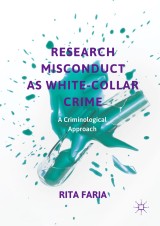Details

Research Misconduct as White-Collar Crime
A Criminological Approach|
CHF 77.00 |
|
| Verlag: | Palgrave Macmillan |
| Format: | |
| Veröffentl.: | 20.09.2018 |
| ISBN/EAN: | 9783319734354 |
| Sprache: | englisch |
Dieses eBook enthält ein Wasserzeichen.
Beschreibungen
<div><br></div><div>This book explores the subject of research misconduct: its definition, what behaviours should fall under its label, and the types of preventive and repressive procedures that should be put to practice to combat it. Adopting a criminological perspective, Faria views research misconduct as a locus of analysis for corporate and white-collar crime. Based upon an empirical study involving in-depth interviews and documentary analysis, this original research offers an interesting approach to an age-old problem which is growing ever more important.</div><div><br></div><div>The commodification of research – together with perceived risks of research misconduct – is opening the way to ambiguous and ineffective forms of social control over scholars, affecting their commitment to research integrity and the responsible conduct of research. Despite this, however, little consensus around the phenomenon exists. Seeking to counter this, Faria opens up the discussion on the potential social harms arising from the current state of affairs, and argues that that criminology should task itself with understanding and researching the pressing topic of research misconduct, including fabrication, falsification, and plagiarism, as well as questionable research practices. </div><div><br></div><div><br></div>
<div><p>Chapter 1. Introduction: “I Committed Scientific Fraud, I Changed and Invented Research Data”.-Chapter 2. Why Should Criminology Be Studying Research Misconduct?.- Chapter 3. What is Research Misconduct?.- Chapter 4. “Good Luck with the Research That Will End Your Career”.- Chapter 5. What Do Researchers Know and Perceive about Research Misconduct?.- Chapter 6. Preventing, Regulating, and Punishing Research Misconduct: Myth of Reality?.- Chapter 7. A Criminological Agenda For Studying Research Misconduct</p></div><div><br></div>
<div><p><b>Rita Faria</b> is Assistant Professor at the School of Criminology, Faculty of Law at the University of Porto, Portugal, and member of the International Research Center on Crime, Justice and Security.</p><br></div>
<div><div>This book explores the subject of research misconduct: its definition, what behaviours should fall under its label, and the types of preventive and repressive procedures that should be put to practice to combat it. Adopting a criminological perspective, Faria views research misconduct as a locus of analysis for corporate and white-collar crime. Based upon an empirical study involving in-depth interviews and documentary analysis, this original research offers an interesting approach to an age-old problem which is growing ever more important.</div><div><br></div><div>The commodification of research – together with perceived risks of research misconduct – is opening the way to ambiguous and ineffective forms of social control over scholars, affecting their commitment to research integrity and the responsible conduct of research. Despite this, however, little consensus around the phenomenon exists. Seeking to counter this, Faria opens up the discussion on the potential social harms arising from the current state of affairs, and argues that that criminology should task itself with understanding and researching the pressing topic of research misconduct, including fabrication, falsification, and plagiarism, as well as questionable research practices. </div></div>
<p>Explores research misconduct within the context of Europe</p><p>Argues why Criminology should be studying research misconduct</p><p>Draws on empirical data: interviews and European social control and public policy documents</p>
“In this pioneering investigation of research misbehaviour and its control, Rita Faria uses interviews with academics to show its variety and causes whilst also analysing (European) policy initiatives that provide – for their own reasons – “official” definitions of the “problem”. Well worth reading.” (David Nelken, Professor of Comparative and Transnational Law, King’s College, London)<p>“When I first heard about Rita Faria’s study, I felt it was a very original, but also quite exotic, theme for a criminologist. Rita Faria analyses quite a number of all kinds of academic malpractice, whilst relating them also to an increasingly production-oriented academic culture. It is a good read, showing that sometimes criminologists resemble their research population.” (René van Swaaningen, Professor of Criminology, Erasmus University Rotterdam, the Netherlands)</p>

















